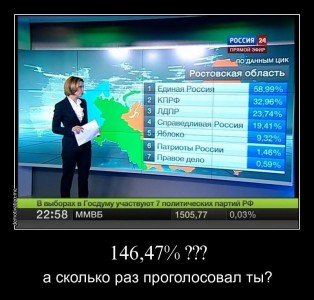This post is part of our special coverage Russia Elections 2011 [1].
Despite the many independent websites down due to DDoS-alypse [2], bloggers were able to share information on elections violations.
The overall feeling online was expressed [3] [ru] by @yar0slav:
Фальсификация выборов проходит без серьезных нарушений.
Paid voting and pens with disappearing ink
The association Golos has shared links to the Google spreadsheets where it reported violations (1 [4], 2 [5]). Numerous violations were reported by many twitterers (it is important to note that many bloggers had signed up as volunteer observers, which is evidence against the assertion that bloggers in Russia are passive cyber-hedonists).
One of the best examples of fraud prevention was made by the journalist Konstantin Yanauskas. Below is the video where he calls the police to block the exit for three people involved in paid voting. The video [6] was uploaded by user vbros2011:
Another video [7] [ru] featured pens with special ink that can be later erased. Such pens were distributed in one of the electoral commissions in Moscow. Uploaded by user yupych:
Blogger and journalist Radulova assembled [8] [ru] a collection of violation videos. @anticarusel [9] [ru], a special team that helped to stop election manipulation, focused on voting by people paid from other regions. It was created by two Moscow activists, Georgiy Alburov and Vadim Korovin.
Election mathematics
Errors in the Russia 24 (federal TV channel) representation of the electoral outcome have become the reason for numerous jokes. In the Rostov region, the sum of voting for all parties reported by the TV channel was 146.47 percent. An hour after the screenshot [10] [ru] from the broadcast became public, bloggers created a graphic [11] that showed the TV host in front of the TV screen and asked: “146.47 percent and how many times did you vote?”
@KermlinRussia shared [13] a similar picture from Voronezh with the sum of ~128 percent. The jokes on TV errors have a sad origin: people from the Chechen Republic returned a suspicious 99.48 percent of votes for United Russia. Other national republics also returned numbers that do not mesh with the quite controversial political situations in those regions, such as Dagestan, where voting for United Russia reached 90 percent. (Dagestan has the highest number of terrorist acts in the country).
The fake account of Igor Sechin (Deputy Prime Minister and a Darth Vader [14] of the Russian politics) wasn't surprised:
А в законе написано, что проценты обязательно должны складываться в 100?
By the end of election day several credible bloggers reported [15] [ru] that the Central Electoral Commission had turned off the GAS voting system. As @KermlinRussia ironically tweeted [16] [ru]:
Система ГАС-выборы в Петербурге отказалась нарушать законы математики и сломалась.
Dazed and confused
Exit polls gave United Russia between 46 to 48.5 percent. According to the Central Electoral Commission, after counting 89 percent of the ballots, United Russia results were higher: 50.05 percent. Moscow bloggers were especially dissatisfied, asking hypothetically: “Who voted for United Russia? I don't know a single person who did.”
The questions examplified the degree of difference between Internet-based human networks and those who watch TV in Russia.
The blogosphere's feeling of anger, distrust and confusion of the election results can be well described by the replies [17] [ru] to President Dmitry Medvedev's tweet: “Thanks for supporting United Russia.” Some of these replies would be cause for a criminal investigation in many countries, as they include harsh and vulgar language.
Disagreeing with the election outcome, Communist leader Gennadiy Zyuganov called [18] [ru] people to go out to the streets: the rally is to begin on Pushkin Square in Moscow at 18:00. Other parties followed suit: another rally, to be held at Chistye Prudy, is scheduled for 19:00 [19] [ru].
The Golos election monitoring association was brief [20] [ru]:
Выборы нелегитимны. Спокойной ночи.
This post is part of our special coverage Russia Elections 2011 [1].
